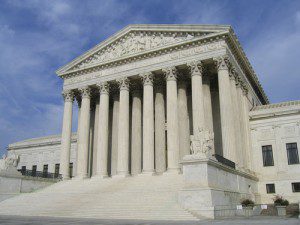 At 10 AM today the Supreme Court in a 5-4 decision upheld the Patient Protection and Affordable Health Care Act’s individual mandate as constitutional. The text of the opinion, in National Federation of Business vs. Sebelius, Case Number 11-393, is available here. Imposition of a tax “leaves an individual with a lawful choice to do or not do a certain act, so long as he is willing to pay a tax levied on that choice,” Roberts says. “The Affordable Care Act’s requirement that certain individuals pay a financial penalty for not obtaining health insurance may reasonably be characterized as a tax. Because the Constitution permits such a tax, it is not our role to forbid it, or to pass upon its wisdom or fairness.” According to Footnote 11, which is on page 44 of the slip opinion: Those subject to the individual mandate may lawfully forgo health insurance and pay higher taxes, or buy health insurance and pay lower taxes. The only thing that they may not lawfully do is buy health insurance and not pay the resulting tax.With this decision finalized, New York State (and the rest of the country) can now move forward with implementing the law. We embrace the much-needed clarity and looking forward to working with our clients moving ahead.Millennium Medical Solutions Corp will be planning health care seminars to review the decision and overview to help understand the impact on employers, plan benefits, and providers. We welcome your suggestions on specific topics or questions you want us to focus on. Please join us!Our office will continue to monitor events and inform our members of any other important news. |
Imndiv Mandatae requirement_flowchart_3

Individual Mandate Penalty Chart
OK so call it a tax instead of a mandate. Will my Auto Insurance be a tax and if I waive coverage I can just pay 1% in case I get into an accident?
What a relief I don’t have to work for the Board of Ed for benefits. Free Medicare for all!
In order to pass the law the taxes are purposely tame. Tax penalties for waiving coverage are only 1%, Employer penalty is $2000/employee, a .9% income tax for couples earning $250K+ etc.
With government funds sharply curtailed this will have to spike in 3-5 years. Today’s economy cannot support this bold plan.
First, let us remember that the massive new influx of people buying insurance means that they will be consuming MORE health-care rather than less. A recent NYT article – Oregon Study Reveals Benefits and Costs of Insuring the Uninsured – http://www.nytimes.com/2012/06/23/health/oregon-study-reveals-benefits-and-costs-of-insuring-the-uninsured.html?pagewanted=all
This does nothing to address the real problem, which is out-of-control rising health-care costs.
Secondly, this Act does nothing to increase the supply of health-care providers. With 25% Medicaid/Medicare cuts floated 2 years ago you know that will rear its head after Novembers election again. I do not recall any allowance being made for increasing the number of medical schools, or incentivizing people to become doctors. Certainly this can be offset by allowing physician-assistants and nurse-practitioners to see more patients independently, but this will not offset the supply shortage that will inevitably develop. Prepare for: longer waits to see a doctor; fewer doctors available to see; higher co-pays and co-insurance amounts, and fewer specialists available. This will be especially harmful to patients who use Medicaid, as more and more doctors will refuse to take Medicaid because they will not be reimbursed in sufficient amount to pay their practices’ expenses.
Lastly, despite the ruling, costs will continue to escalate for the states. There will be political demands made on state legislatures to increase Medicaid benefits/spending to conform to this law, and many state legislatures(NY and CA come to mind) will go along.
Longer-term, I predict that the states will begin to require that ALL doctors take a certain number of Medicaid patients as a condition of maintaining their licenses—mandatory medical “pro bono”, as it were. The central government will effectuate this by offering to give the states additional money to do so, or by withholding funds from states that do not change their rules. This will either drive down Medical School students or drive existing doctors out of the profession.
This, in turn, will lead to the effective nationalization or a single payer system – call it it USA for Free Insurance. Once the law is passed and popularized this will be the 3rd rail of politics.
Will this ration healthcare and dictate treatment of doctors?
I hope your next post will compare this time frame to the reaction of businesses and providers when Medicare was implemented in the 1960s and how healthcare changed. Doctors incomes rose after Medicare was implemented and there was a brief “spike” in the CPI as government spending increased demand for healthcare services. Consequently, the same providers who had opposed Medicare were among the first to reap its benefits and Medicare has been an American institution ever since. Will this be the same, or different? What worries me is that there is no penalty for people who abuse their health, or the companies (cigarette, fast food, soft drink) who provide the means to do so. Also, it will be interesting to see how this influences immigration now that many foreigners will see the US as a place to get free healthcare.